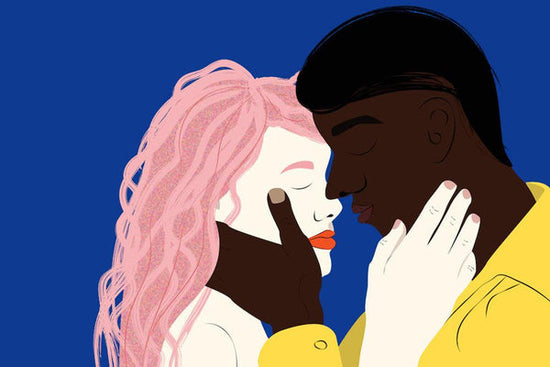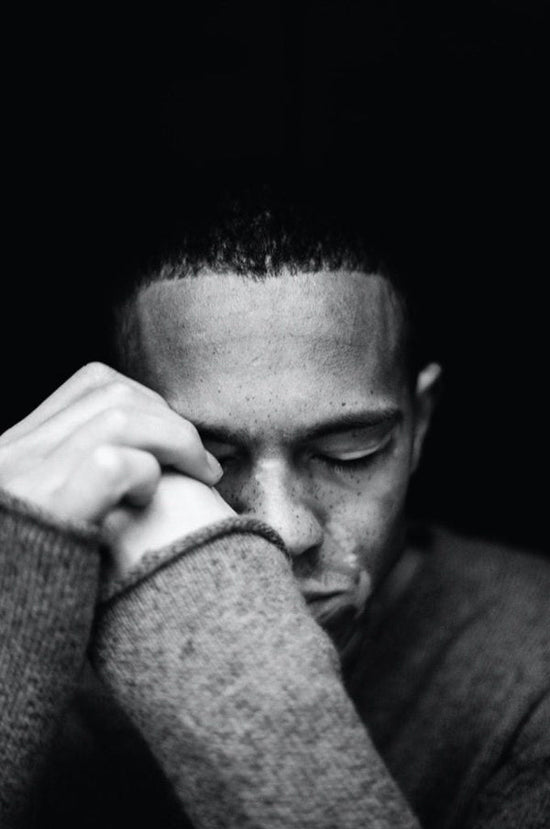Dysmetropsia: What is it like dating with Alice in Wonderland syndrome
Featured Articles
Dating and having sex with dysmetropisa can be complicated. Learn about Abbey's true-life story about dysmetropsia, sex, and relationships.

Dating and having sex with dysmetropsia can be complicated
This is an edited transcript of URevolution's Sex Like This Podcast | S1 E3 Dysmetropsia: What is it like dating with Alice in Wonderland syndrome?
Abbey
I had quite a bad dysmetropsia flare-up mid-date, and I was quite scared. It’s the first time that’s really happened to me on a date. And I just kind of turned and said, “I don’t want to scare you, but I think I might pass out.” And I very, very quickly did a brief rundown of “I have this illness, it causes me to do this thing. I need to quietly sit with my head between my legs, and there’s a chance I’ll pass out. Could you please make sure my head doesn’t hit the pavement? And he just went, “yeah, that’s fine.”
Nicole Edwards
There are over 7 billion people on the planet. And most of us are looking for love. So if we couple off, you know, unless you’ve come up with a more interesting arrangement, that means there are theoretically about three and a half billion people in the world that could be the one for you. And counting. So, why do we always hear the same love stories with all of these options? The cookie-cutter, storybook version of what it’s like to fall in love is told over and over again. Well, friends that stops here, you’re listening to Sex Like This, a podcast brought to you by Uncomfortable Revolution about sex and dating with a chronic illness or disability.
I’m your host Health Journalist, Nicole Edwards.
Today we’re exploring what it is like to date and have sex with Alice in Wonderland Syndrome (also known as Todd’s syndrome or dysmetropsia)
Dysmetropisia for dummies
Abbey has been experiencing the symptoms of dysmetropsia since she was a little kid. When she hit puberty, the symptoms got a lot worse, and she spent a long time figuring out exactly what was happening to her. That’s because the symptoms were really strange as you’re about to hear.
Abbey
Some people call it Alice in Wonderland Syndrome. It is also known as Todd's syndrome or dysmetropsia after a British psychiatrist, Dr. John Todd, who identified in the 1950s. He noted that anecdotes of this syndrome closely resembled the experiences of Alice Liddell in Lewis Carroll's novel "Alice's Adventures in Wonderland."
The best way to describe my dysmetropsia symptoms was that it was just a feeling that nothing was entirely right. But it's tough to explain how that feels unless you've had it yourself.
Dysmetropsia is a feeling of being entirely out of your surroundings: of distorted perception and disorientation. A bit like if you were in a dream and you become aware that what is happening isn't reality. That's how I felt in reality, for most of the day, every day for about ten years.
Nicole Edwards
By the time Abbey was 14, her dysmetropsia symptoms had taken her even deeper into Wonderland. She had dizzy spells, and she fainted a lot. Her mom got worried and took her to see a doctor to see if her dysmetropsia could be treated.
Abbey
I knew in my heart that it was a physical thing that was happening to me. But they often were trying to frame it as, “you have an eating disorder,” or “you’re depressed, or you’re stressed,” because I would say things like, “well, it happens when I eat.” And instead of taking that as a physical reaction, they take it as you’re having kind of some kind of psychological reaction. And I suppose being a teenage girl, it’s not unreasonable for them to think that. But they were kind of not keen to pursue many other lines of inquiry. And they would constantly ask me about school, pressure, and home life. And of course, those things were stressful because you’re 14 and everyone’s stressed.
It’s a horrible time a lot of the time. But I found it really difficult to say to them, “yes, those things are stressful, but that isn’t what this is.” So then I started to be quite scared about describing some of the more “mad” things that were happening because I just thought, well, if they don’t believe dizziness, they’re not going to believe that I feel like I’m trapped in a nightmare I can’t get out of. And they’re not going to believe that I look in the mirror and I think my head’s too big. Like that. Then I just shut down a little bit from really telling people what went on. Even my mom. Like, it’s only been the last couple of years that I’ve told her some of the more “mad” things that I used to see and feel.
Getting diagnosed with Dysmetropsia was a struggle
Nicole Edwards
The experience of something going wrong inside your body is already hard enough. So, it makes sense that Abbey would start to feel kind of hopeless as doctors fumbled for an answer to what was wrong with her.
Abbey
After a few years, they started really to pursue the depression angle. And I think I was definitely depressed. To me, depression feels like drowning.
But I was depressed because I had an undiagnosed chronic illness that nobody took seriously.
Nicole Edwards
There’s a long history of doctors seeing women as overreacting when it comes to physical issues or life in general. It’s actually where the term “hysterical” originates – from the ancient Greek word histericos, which means a suffering in the uterus. When Abbey thinks about whether or not this would have happened if she were a boy, she says.
Abbey
100% no. Because for so long, they told me it was hormonal. They tried to put me on the pill to make it go away. And I think it was just dismissed as hysteria. l just wasn’t doing what I guess “normal” teens and 20-year-olds were doing. So it was quite isolating. And that meant that I wasn’t in that whole dating scene until quite a lot later.
I was sick a lot of the time, I was tired a lot of the time, and I just wasn’t even that interested because I just felt so unwell. It wasn’t really a priority for me. I wouldn’t be out at parties. I wasn’t able to drink alcohol. And, dating culture – I don’t know what it’s like everywhere, but – in London, it’s very drink-focused.
Nicole Edwards
But then, one night, at a party with her friends, Abbey meets a guy who’s also not drinking. In fact, they seem to be the only two in the room who are saying no to cocktails, and they bond over that. Well, they bond over more than that. And suddenly, Abbey’s in the midst of her first romance, but it wasn’t easy for a few reasons. One, she was still fighting all these symptoms without much support and without a diagnosis. Two, her new partner wasn’t very sympathetic to what she was going through.
Abbey
So, it was always out there that this was a thing that was happening to me, but I think he didn’t maybe realize how bad it was and what impact that would have on me, and the relationship in general. And, the huge problem that arose was first, I was so fatigued that I couldn’t do a lot of things and I wouldn’t want to go places. And I wasn’t able to socialize as much, which is hard on whoever you’re with. And then the second thing was that, with the problems with my digestion, one of the things that really happened would be I would eat but I would never not be hungry, because my food wasn’t being digested properly. So, I was always starving. And I subsequently gained a lot of weight. And I was so self-conscious because, for me, it was out of control, and I didn’t know how to stop it.
That was a real problem between us: he would make comments and would discourage me from eating, which is obviously not helpful. And it wasn’t a good combination of personalities, I don’t think. I think we were not the right people for each other. We were both people that probably needed a bit of support for different reasons. And you can’t really have two of those people in one relationship, I think.
Do you have a dysmetropsia story? Click here to send us your submission
My partner didn't accept my Dysmetropsia
Nicole Edwards
Abbey eventually wrote her partner a letter, and she read it to him aloud. It was about how she thought it was time for them to go their separate ways. They were both clearly unhappy, and she wanted to move forward with her life. She wanted the same thing for him. So, they split. And then Abbey was solo again, still in Wonderland, still trying to figure out what the hell was going on with her body.
It wasn’t until she started Googling her symptoms – which we all know is a slippery slope – that she finally found a neurologist in London that she thought might be able to help her. Remember, Abbey hadn’t been telling the full truth about her symptoms for a while now. But, by this time she was in her mid-20s. And she had built up some more confidence. Plus, the doctor was highly recommended.
Abbey
So, I plucked up the courage to go in and tell him every single “mad” thing that was happening. And he just sat there and took the whole thing and didn’t bat an eyelid, which was a nice surprise.
And he said, “you have a form of dysmetropsia – and one of the symptoms is a very unusual form of migraine. So whilst you haven’t been having headaches, the chemistry in your brain doesn’t work properly. And these dysmetropsia attacks you’re having are your brain being flooded with the wrong kind of chemicals and too much of them. And that’s why sometimes you feel like you’re having a stroke, and that is why sometimes you feel like you are going to faint, and sometimes you do.”
That’s why with dysmetropsia, I can sometimes smell electrical burning that’s not there. Because it’s an activated factory pathway in my nose wrongly for some bizarre reason. And that is why sometimes I can smell lemon cake!
And I remained calm, and he told me about various treatments we could do, various diets, and lifestyle things. But after that initial appointment, I came out of that office and sobbed. I don’t think I had realized how much I had stored the stress up for so long. And there was a man working on a building site opposite and he – from his perspective – all he saw was a girl come out of a hospital and collapse onto the floor crying.
And I have to try and tell him it was happy tears, because he looked so concerned! It was such a relief to finally have somebody believe what happened, but also to be able to put a label on it – dysmetropsia – and not think it was weird and have an answer for every single symptom. It was a good day.
Nicole Edwards
And so, Abbey finally gets to leave Wonderland. Not that the dysmetropsia symptoms are gone for good, but having a name for them has helped Abbey gain control over her health and her dating life. Instead of being nervous about telling people what’s going on with her body, she can own it now. Naming her illness is something she’s been trying to do for years now. So finally having something to call it has helped her move on a bit. And when she has time, she’s playing the field.
Abbey
Yeah, dysmetropsia doesn’t feel like such a big deal anymore. And I think it’s a combination of, like you say, having a name for it, being upfront about it – whatever that means – whether that’s the first date or it’s a few dates in. And me accepting it a bit more.
So now I treat it as just another thing about me. There are no know treatment options for dysmetropsia, so the way I manage my symptoms is to rest and wait for them to pass.
While my dysmetropsia symptoms can be disorienting, more so when I didn't know what was wrong with me, they aren’t harmful and aren't an indicator of more serious issues. Over time I have started to experience fewer symptoms over time, and hopefully, according to my neurologist, my dysmetropsia syndrome may disappear over time.
And then there’s some cool stuff, fun facts, about dysmetropsia. So, I found out the other day that women that used to have dysmetropsia back in the Victorian times would have been put into Bedlam, which was like the “lunatic” asylum. I found out that it was called “floating woman’s disease.” So, I just now consider dysmetropisia symptoms like a fun quirk.
And some of the dysmetropsia symptoms are quite funny! Like, you know, look in the mirror and see a massive head – that’s weird. Like, it’s just another aspect of who I am. You tell people that, and they’re genuinely interested because what a “weird” thing to have wrong with you. And so, instead of hiding it, I’m just like, “yeah, this is the ‘mad’ stuff that happens.” And it could be quite a good conversation starter!
Do you have your own dysmetropsia story you want to share? Click here.
How to listen to Dysmetropsia: What is it like dating with Alice in Wonderland syndrome?: watch the video below (if the CC icon is not on your screen, tap the screen to make it appear)

URevolution
UR is on a mission to change the way we talk about sensitive health topics, one awkward blogpost at a time. Posts by this author are from the Editors at UR.
Caption:
Dysmetropsia is a feeling of being entirely out of your surroundings: of distorted perception and disorientation. A bit like if you were in a dream and you become aware that what is happening isn't reality. That's how I felt in reality, for most of the day, every day for about ten years.


















